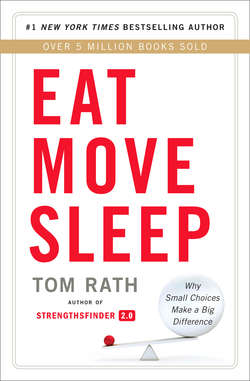Читать книгу Eat Move Sleep - Tom Rath - Страница 19
На сайте Литреса книга снята с продажи.
ОглавлениеMaking Smarter Decisions
10
Prioritize Your Protein
Research has shown how consumption of specific protein sources can provide the nutrients you need, without the negative effects of hot dogs, hamburgers, or pastrami sandwiches. While it may be okay to eat meat occasionally, you can get all the protein you need from plant-based sources.
Getting more protein from fruits, vegetables, nuts, and fish will also increase your intake of omega-3s, which are deficient in most people’s diets today. Omega-3s are essential fatty acids shown to protect against certain cancers, cognitive decline, macular degeneration, and heart disease. They can also decrease depressive symptoms and improve your mood.
One experiment found that participants who consumed omega-3s had a 20 percent reduction in anxiety levels and a significant reduction in inflammation, compared with a control group. A 2012 study revealed that people with low levels of omega-3s even had smaller brains (on MRI scans) and lower scores on tests of basic mental ability. Ideal sources of omega-3s are fish, nuts, and seeds; salmon, walnuts, and flaxseeds are the best of the bunch.
Base most of your meals around protein from plant-based sources and seafood with the lowest mercury levels. If the majority of your protein comes from these sources with higher omega-3 content, you may notice a difference in how you feel each day. Eating the right mix of these foods can boost your mood and improve your long-term health.
Eat More
Eat Less
Fruit & Vegetables (asparagus, avocado, beans, broccoli, cauliflower, chickpeas, collard greens, lentils, peas, spinach)
Nuts (almonds, cashews, peanuts, pecans, pistachios, walnuts)
Seafood (flounder, herring, salmon, scallops, shrimp, sole, tilapia, trout)
White Meat (chicken & turkey)
Dairy (cheese, cream, milk, yogurt)
Red Meat (beef, duck, lamb, pork)
Processed Meat (bacon, lunch meat, salami, sausage)
Stop Buying Junk for Friends
In the grocery store, I find it easy to rationalize buying cookies by telling myself I am “getting them for friends” or to serve at an event. What’s really happening is: I am telling others that I value their health and well-being less than my own. Studies show that people consistently buy less healthy foods for others than for themselves. When making food purchases for themselves, people buy a balance of foods. However, when choosing food for family or friends, people are more likely to buy junk food.
Until I thought this through, my decisions when entertaining were as bad as anyone else’s. My standard plan for having guests over was to order pizza or grill burgers. Then I realized it might be time to value the health of others as much as I value my own. Put yourself in the place of one of your friends, family members, or dinner guests. How often do you go somewhere and the food options are not as healthy or diverse as what you would select on your own?
The problem is, most of us want healthy options for ourselves but assume incorrectly that others prefer less healthy foods. Change this trend in your networks, and start bringing healthier food to gatherings. If nothing else, it will tell your friends you value their health as much as your own.
Find Your Motivation to Move
